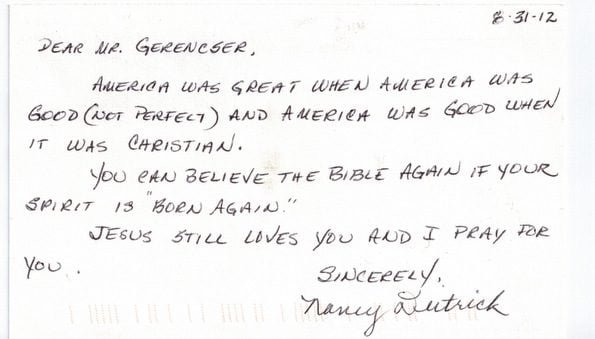
In light of the recent repudiation of The Boy Who Came Back From Heaven by its author, Alex Malarkey, I thought I would repost my review of a similar book of fiction, Colton Burpo’s story, Heaven is for Real.
Heaven is for Real is the life-near-death-back-to-life story of a four-year old boy named Colton Burpo. Colton is the son of Todd and Sonja Burpo. The story is revealed by Colton to his father over the course of three or four years (2003-2007). The book detailing the story was written in 2010.
Todd Burpo is the pastor of Crossroads Wesleyan Church (link no longer active) in Imperial, Nebraska. A significant amount of time is spent detailing the day-to-day life of Todd Burpo, pastor. Burpo paints an all-too-typical picture of the ministry. Long hours, overworked, underpaid, under-appreciated. As a former pastor myself, I found Burpo’s story seemed quite familiar.
The young Burpo family had their fair share of adversity. Todd was diagnosed with a severe leg problem, kidney stones, and hyperplasia. A breast biopsy showed cancer cells which resulted in the surgical removal of Todd’s breasts. Sonja had a miscarriage. On top of these trials, their son Colton required emergency treatment for a ruptured appendix. Colton was shuffled among 3 hospitals before the proper diagnosis was made. He almost died. Almost…
According to the Burpos, Heaven is for Real is a testimony to the power of prayer. Multiple illustrations throughout the book give clear testimony to the Christian God being a prayer-answering God. Todd gives a testimony of being healed of cancer. A biopsy was used to first diagnose Burpo’s cancer. After having a mastectomy, the doctor was astounded to find no cancer in the removed tissue. The doctor said “I don’t know what to say. I don’t know how that happened.” Burpo writes “I knew: God had loved me with a little miracle.”
The focus of Heaven is for Real is Colton Burpo’s near-death experience while being operated on for a ruptured appendix. After Colton came out of surgery, he began screaming for his father. Todd raced to his son’s side. Colton said to Todd, “Daddy, you know I almost died.”
There is little doubt about Colton almost dying. He went five days before being diagnosed with a ruptured appendix. By then, his body was full of infection. The doctors left tubes in Colton’s abdomen to drain the infection. After a grueling ordeal that lasted 15 days, Colton was released from the hospital. Burpo credits the prayers of God’s people for the miraculous deliverance of Colton from the jaws of death.
Burpo tells an incredible story that I have heard time and time again. Doctor bills are astronomical. What are we going to do? Pray! And lo and behold, God comes through with the exact amount needed to pay the medical bills.
A closer look at these kind of stories often yields a different conclusion. Take the Burpos’ case. First, the Burpos had insurance. According to the book, the deductible was $3,200.00. Burpo does not say what the maximum out-of-pocket amount is, so readers are left to wonder how much the insurance actually paid and how much the Burpo’s had to pay. What we do know is that God provided the Burpos with almost $23,000.00 in gifts and donations to be used for medical expenses.
After Colton was fully recovered, the Burpos noticed that Colton seemed quite focused on people knowing Jesus as their Savior (having Jesus in their heart).
Todd writes:
I didn’t know what to think. Where was this sudden concern over whether a stranger was saved , whether he had Jesus in his heart, as Colton put it, coming from?
Four months after Colton’s near-death experience, the Burpo family took a Fourth of July trip to Sioux City, South Dakota to visit Sonja’s brother. While traveling to Sioux City, Todd, Sonja and Colton had a discussion about Colton’s time in the hospital.
Colton: “Yes Mommy, I remember, that’s where the angels sang to me.”
Todd: “Colton, you said the angels sang to you while you were in the hospital.”
Todd: “What did they sing to you?”
Colton: “Well they sang Jesus Loves Me and Joshua Fought the Battle of Jericho. I asked them to sing We Will, We Will, Rock You, but they wouldn’t sing that” (implication: angels hate rock music).
Todd: “What did the angels look like?”
Colton: “ Well, one of them looked like Grandpa Dennis, but it wasn’t him ‘cause Grandpa Dennis has glasses.”
Colton: “Dad, Jesus had the angels sing to me because I was so scared. They made me feel better.”
Todd: “You mean Jesus was there?”
Colton: “Yeah Jesus was there.”
Todd: “Well, where was Jesus?”
Colton: “I was sitting in Jesus’ lap.”
Todd: “Colton, where were you when you saw Jesus?”
Colton: “At the hospital. You know, when Dr. O’Holleran was working on me.”
Todd: “But you were in the operating room, Colton. How could you see what we were doing?”
Colton: “ ‘Cause I could see you. I went up out of my body and I was looking down and I could see the doctor working on my body. And I saw you and Mommy . You were in a little room by yourself, praying; and Mommy was in a different room, and she was praying and talking on the phone.”
And so the story Heaven is for Real begins.
Here are some of the things that four-year old Colton revealed to his parents:
- Jesus was baptized by his cousin and his cousin was really nice. (John the Baptist was the cousin of Jesus.)
- Jesus rode a rainbow-colored horse.
- Jesus has brown hair and hair on his face.
- Jesus has pretty eyes.
- Jesus wore clothes that were purple and white.
- Jesus wore a crown with a pink, diamond-like stone in the middle.
- Jesus had red markers (nail prints) in his hands and feet.
- Jesus gave Colton work to do and that was his favorite part of Heaven.
- There were a lot of kids in heaven.
- Everyone in heaven has wings and people fly everywhere they go.
- Jesus didn’t have wings and he went up and down like an elevator.
- All the people in heaven look like angels and have a light above their head.
- He saw Pop, his Dad’s grandfather, in heaven.
- Pop told Colton about his dog that had one blue and one brown eye.
- Jesus went to Colton’s Dad and told him he wanted him (dad) to be a pastor.
- Jesus was really happy Dad became a pastor.
- Colton saw his 8-week-old miscarried sister in Heaven.
- Colton told his Mom it was OK his sister died because God the Father adopted her.
- His sister didn’t have a name in heaven because her parents never named her.
- God the Father has a throne in heaven and Jesus sits on a throne right next to him.
- Jesus sat on the right side of the Father.
- The angel Gabriel sat on a throne on the left side of God the Father.
- Colton sat on a small chair near the Holy Spirit.
- Colton prayed for his parents while he was in Heaven.
- The Holy Spirit is colored blue.
- God and Jesus light up Heaven and it never gets dark.
- There were animals in Heaven.
- The gates of Heaven had gold and pearl on them.
- The heavenly city was made of something shiny.
- Jesus really, really, really loves children.
- Jesus died on the cross so we could go see God, the Father.
- No one is old in Heaven.
- The Holy Spirit shoots power down from Heaven when Todd is preaching.
- Satan is not in hell yet.
- The angels use swords to keep Satan out of Heaven.
- Jesus wouldn’t let Colton have a sword because it would be too dangerous.
- Colton saw Satan (but refused to talk about it).
Colton also told of a future day when there will be a war. Good people and good angels are going to fight against Satan, bad angels, monsters, and bad people. While this war is going on, the women and children get to stand back and watch. Colton saw his Dad fighting on God’s side. Jesus wins and throws Satan into hell.
And so, there you have it. Colton told his father that he saw all of the above in three minutes. That’s how long he was in Heaven…three minutes. It took the Burpos four years to get the whole story out of Colton.
What are we to make of Heaven is for Real, A Little Boy’s Astounding Story of His Trip to Heaven and Back?
First, Colton was raised in a pastor’s home. He was taught from his earliest days the stories of the Bible. That he was conversant in “church-talk” should not be surprising. Most preacher’s kids learn “church-talk” at an early age.
It is quite evident that Colton has a vivid imagination. Having raised four boys myself, I am well aware of the imaginative powers young boys (and girls) have. My three-year-old grandson, only 11 months younger than Colton was when he had his vision, has quite an imagination. On any given day he believes he is Batman, Superman, or the Incredible Hulk.
Most of the book consists of Todd Burpo trying to prove that what Colton saw has a Biblical basis. Virtually every part of the vision was fact-checked according to the Bible. Colton’s vision always matched what the Bible said. Amazing, yes? The Bible is an amazing book. It can be made to say anything and it can be used to prove even the most astounding things.
As I read the book, I found myself saying, “is the story told by Colton in the language of a four year old?” It isn’t. The story has been polished for publication. Only Todd Burpo knows what the actual story is. I am not suggesting that Burpo is lying, but I am saying the story shows the marks of being shaped by adults. One, seemingly insignificant, example of this stood out to me. Colton asked the angels to sing We Will, We will Rock you. I thought, “would a boy a few months short of four say We Will, We Will Rock you or would he more likely say We will Rock you or Rock you?”
For those who are Evangelical Christians, the book has numerous theological problems. I want to focus on just one of them.
Colton describes heaven as a place filled with people, especially lots of kids. This description flies in the face of orthodox Christian doctrine concerning death and the resurrection from the dead. When people die, they are put in the grave to await the resurrection from the dead. Depending on what eschatological view a person has, the Christian’s body remains in the grave (or wherever its final resting place is) until Jesus comes again or until the final judgment. At that moment, the Christian dead will be resurrected and given a perfect body. At this time, there are NO physical bodies running around heaven.
NT Wright writes:
There is no agreement in the church today about what happens to people when they die. Yet the New Testament is crystal clear on the matter: In a classic passage, Paul speaks of “the redemption of our bodies” (Rom. 8:23). There is no room for doubt as to what he means: God’s people are promised a new type of bodily existence, the fulfillment and redemption of our present bodily life. The rest of the early Christian writings, where they address the subject, are completely in tune with this.
The traditional picture of people going to either heaven or hell as a one-stage, postmortem journey represents a serious distortion and diminution of the Christian hope. Bodily resurrection is not just one odd bit of that hope. It is the element that gives shape and meaning to the rest of the story of God’s ultimate purposes. If we squeeze it to the margins, as many have done by implication, or indeed, if we leave it out altogether, as some have done quite explicitly, we don’t just lose an extra feature, like buying a car that happens not to have electrically operated mirrors. We lose the central engine, which drives it and gives every other component its reason for working.
….When Paul speaks in Philippians 3 of being “citizens of heaven,” he doesn’t mean that we shall retire there when we have finished our work here. He says in the next line that Jesus will come from heaven in order to transform the present humble body into a glorious body like his own. Jesus will do this by the power through which he makes all things subject to himself. This little statement contains in a nutshell more or less all Paul’s thought on the subject. The risen Jesus is both the model for the Christian’s future body and the means by which it comes.
Similarly, in Colossians 3:1–4, Paul says that when the Messiah (the one “who is your life”) appears, then you too will appear with him in glory. Paul does not say “one day you will go to be with him.” No, you already possess life in him. This new life, which the Christian possesses secretly, invisible to the world, will burst forth into full bodily reality and visibility.
The clearest and strongest passage is Romans 8:9–11. If the Spirit of God, the Spirit of Jesus the Messiah, dwells in you, says Paul, then the one who raised the Messiah from the dead will give life to your mortal bodies as well, through his Spirit who dwells in you. God will give life, not to a disembodied spirit, not to what many people have thought of as a spiritual body in the sense of a nonphysical one, but “to your mortal bodies also.”
Other New Testament writers support this view. The first letter of John declares that when Jesus appears, we shall be like him, for we shall see him as he is. The resurrection body of Jesus, which at the moment is almost unimaginable to us in its glory and power, will be the model for our own. And of course within John’s gospel, despite the puzzlement of those who want to read the book in a very different way, we have some of the clearest statements of future bodily resurrection. Jesus reaffirms the widespread Jewish expectation of resurrection in the last day, and announces that the hour for this has already arrived. It is quite explicit: “The hour is coming,” he says, “indeed, it is already here, when the dead will hear the voice of the Son of Man, and those who hear will live; when all in the graves will come out, those who have done good, to the resurrection of life, and those who have done evil, to the resurrection of judgment.”….
Evidently bad theology is less of a problem for Evangelicals than is was years ago. Heaven is for Real is a bestselling book among Evangelical Christians. At our local library, the waiting list for Heaven is for Real is 488 patrons long. Astoundingly, it is the number one seller on the Amazon.com book list.
From a non-theist perspective, Heaven is for Real is cheap lit of the worst kind. It is a work of fiction, and not very good fiction either. Sadly, many Evangelicals will see this as a wonderful, true story. The book reinforces their view that life is filled with tragedy but heaven awaits all those who, through Jesus, faithfully endure what life gives them.
Todd Burpo said in the preface:
I am not a believer in superstition.
Heaven is for Real is 162 pages of proof that he does.
The Heaven is For Real website.
050516
Share This Post On Social Media:










